-
ORIGINAL ARTICLE10-21-2022
“EMPODEREENF”: construction of an application for nurses’ continuing education on psychological violence against women
Revista Brasileira de Enfermagem. 2022;75(5):e20200391
Abstract
ORIGINAL ARTICLE“EMPODEREENF”: construction of an application for nurses’ continuing education on psychological violence against women
Revista Brasileira de Enfermagem. 2022;75(5):e20200391
DOI 10.1590/0034-7167-2020-0391
Views0See moreABSTRACT
Objective:
to construct a prototype of a mobile application on psychological violence against women to facilitate nurses’ continuing education.
Method:
an applied methodological research of technological development, based on the Contextualized Instructional Design method.
Results:
the prototype content was based on the learning objectives developed through a narrative review, which guided an integrative review to compile the information. The prototype is called “EmpodereEnf”, and is composed of an initial screen, bringing nurses as a target audience, and, soon after, offering nine general moblets for access to information such as: concepts, causes, manifestations and consequences of psychological violence; means for identification and approach in nursing consultation and health education; compulsory notification and referral; examples of cases of psychological violence and references.
Final considerations:
the prototype is a possibility for future coping interventions and a work tool for nurses in the face of psychological violence against women.

-
ORIGINAL ARTICLE10-21-2022
Management in the Family Health Strategy: workloads and structured institutional violence
Revista Brasileira de Enfermagem. 2022;75(3):e20220071
Abstract
ORIGINAL ARTICLEManagement in the Family Health Strategy: workloads and structured institutional violence
Revista Brasileira de Enfermagem. 2022;75(3):e20220071
DOI 10.1590/0034-7167-2022-0071
Views0See moreABSTRACT
Objectives:
to understand the relationship between workloads and institutional violence in Family Health Strategy managers’ practice.
Methods:
qualitative research using theoretical triangulation and data from semi-structured interviews. Participants were 35 managers of Basic Health Units in the five Regions of Brazil, who worked in the Family Health Strategy. We used thematic analysis and ATLAS.ti for data analysis.
Results:
workloads were analyzed, showing relationships with institutional violence. Thematic categories emerged: “related to the management work itself”; “related to other instances of health system management”; “related to users and community”. There was an interrelationship between increased managers’ workloads and institutional violence.
Final Considerations:
the Family Health Strategy is relevant for universal access to health and requires favorable institutional conditions for its effectiveness. Adverse scenarios lead to increased workloads, approaching institutional violence.
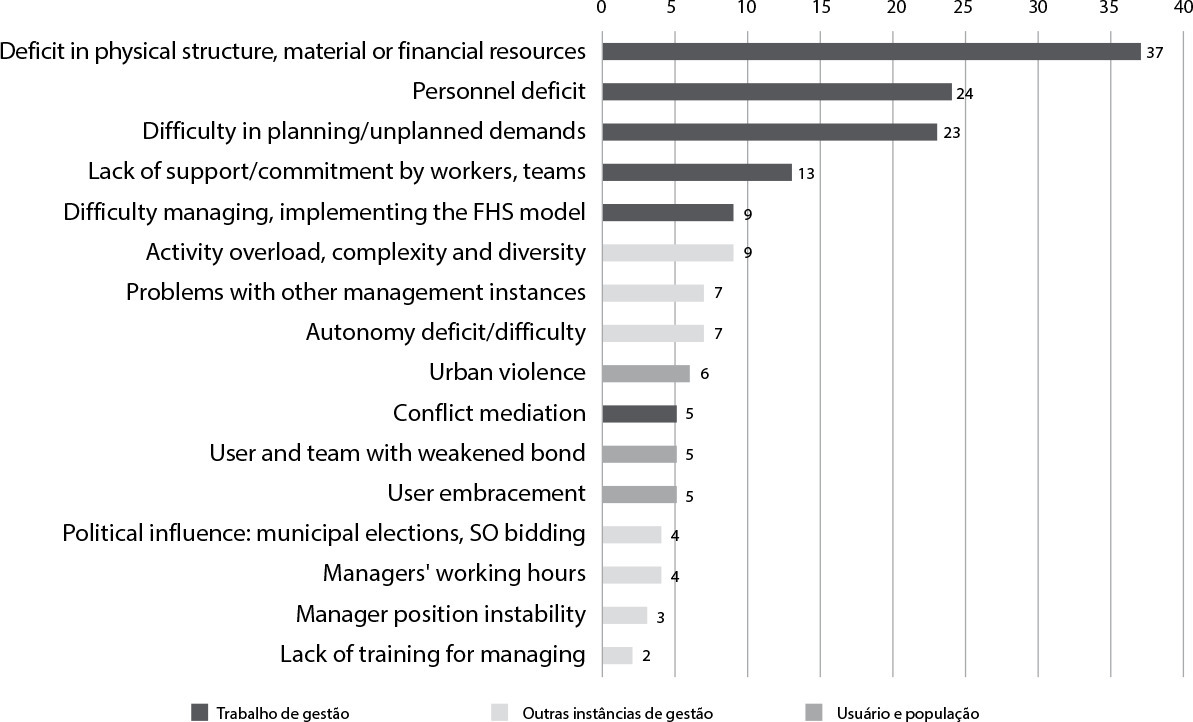
-
ORIGINAL ARTICLE10-21-2022
Self-care deficit among older men in the COVID-19 pandemic: implications for nursing
Revista Brasileira de Enfermagem. 2022;75:e20210933
Abstract
ORIGINAL ARTICLESelf-care deficit among older men in the COVID-19 pandemic: implications for nursing
Revista Brasileira de Enfermagem. 2022;75:e20210933
DOI 10.1590/0034-7167-2021-0933
Views0See moreABSTRACT
Objectives:
to analyze self-care deficit among older men in the COVID-19 pandemic in Brazil and to discuss the implications for nursing practice.
Methods:
web survey, multicentric, qualitative. A total of 120 older men participated, applying a form from April to June 2020 and April to August 2021. Reflective Thematic Analysis, interpreted by Orem’s Self-Care Deficit Theory, was used.
Results:
temporally, the self-care of older men was manifested in the self-care requirements – affective bonds, self-care for development – meditation and self-care with health deviations – remote consultations. Fully, partially compensatory, educational/support systems mobilized self-care.
Final Considerations:
as care managers, nurses can strengthen the support network for older men by activating professionals from the multidisciplinary team, family members, caregivers and the community to promote self-care and correct health deviations in times of crisis.

-
ORIGINAL ARTICLE10-21-2022
Circle dance: integrative and complementary practice in the daily health promotion for older adults
Revista Brasileira de Enfermagem. 2022;75:e20210003
Abstract
ORIGINAL ARTICLECircle dance: integrative and complementary practice in the daily health promotion for older adults
Revista Brasileira de Enfermagem. 2022;75:e20210003
DOI 10.1590/0034-7167-2021-0003
Views0See moreABSTRACT
Objectives:
to understand circle dance as an integrative and complementary practice for health promotion in older adults’ daily lives.
Methods:
an interpretive, qualitative study, based on Michel Maffesoli’s Comprehensive Sociology of Everyday Life. There were 20 participants, 17 older adults and three focalizers in circles held in Basic Health Units in a municipality in southern Brazil. Data were collected through interviews and observation, between September 2016 and March 2017, and analyzed through preliminary analysis, ordering, key links, coding and categorization.
Results:
three categories emerged that express the daily life of circle dance with older adults: circles that spin; challenges for new circles to spin; entering, being and staying in the circle.
Final Considerations:
circle dance provided older adults with a feeling of belonging to a group, combined with pleasure and well-being, contributing to promotion of older adults’ health.
-
ORIGINAL ARTICLE10-18-2022
Knowledge about antineoplastic drugs: implications for the health of nursing workers in a general hospital
Revista Brasileira de Enfermagem. 2022;75(3):e20210025
Abstract
ORIGINAL ARTICLEKnowledge about antineoplastic drugs: implications for the health of nursing workers in a general hospital
Revista Brasileira de Enfermagem. 2022;75(3):e20210025
DOI 10.1590/0034-7167-2021-0025
Views0See moreABSTRACT
Objectives:
to understand, from a worker’s health perspective, the knowledge of nursing professionals about the use of antineoplastic drugs in a general hospital.
Methods:
a descriptive and exploratory study with a qualitative approach. It was conducted at a university hospital, between April and August 2018, with 35 nursing professionals who responded to a semi-structured interview. Thematic analysis was used for data treatment.
Results:
from the data, three thematic categories emerged, related to the nursing professionals’ knowledge about antineoplastic drugs and their effects on workers’ health; situations in which exposure to these drugs occurs; and protection mechanisms for the patient, the environment, and the worker.
Final Considerations:
the nursing professionals had little knowledge about antineoplastic drugs. The practices related to handling and the necessary protective measures to deal with these drugs were empirically determined and relatively subsidized the knowledge acquired by the professionals.
-
ORIGINAL ARTICLE10-18-2022
Opinions of healthcare students on organ and tissue donation for transplantation
Revista Brasileira de Enfermagem. 2022;75(3):e20210001
Abstract
ORIGINAL ARTICLEOpinions of healthcare students on organ and tissue donation for transplantation
Revista Brasileira de Enfermagem. 2022;75(3):e20210001
DOI 10.1590/0034-7167-2021-0001
Views0See moreABSTRACT
Objectives:
to analyze the opinions of healthcare students on organ and tissue donation for transplantation.
Methods:
qualitative document analysis study, using the records of a database and analyzing data from two perspectives: 1) Lexical analysis, with the IRAMUTEQ software, and 2) Thematic content analysis.
Results:
from the analysis, 3 main categories were generated: 1) Organ and tissue donation as an act of love for others and an opportunity of a new beginning; 2) Clarification and awareness on organ and tissue donation; and 3) Importance of communicating the family and promoting organ and tissue donation.
Final Considerations:
despite being in favor of donation, students also recognize the presence of social taboos; the discussion in the family nucleus, promoting the theme and raising awareness in society are considered important. Additionally, the education of students is one of the possibilities of intervention for the issue.
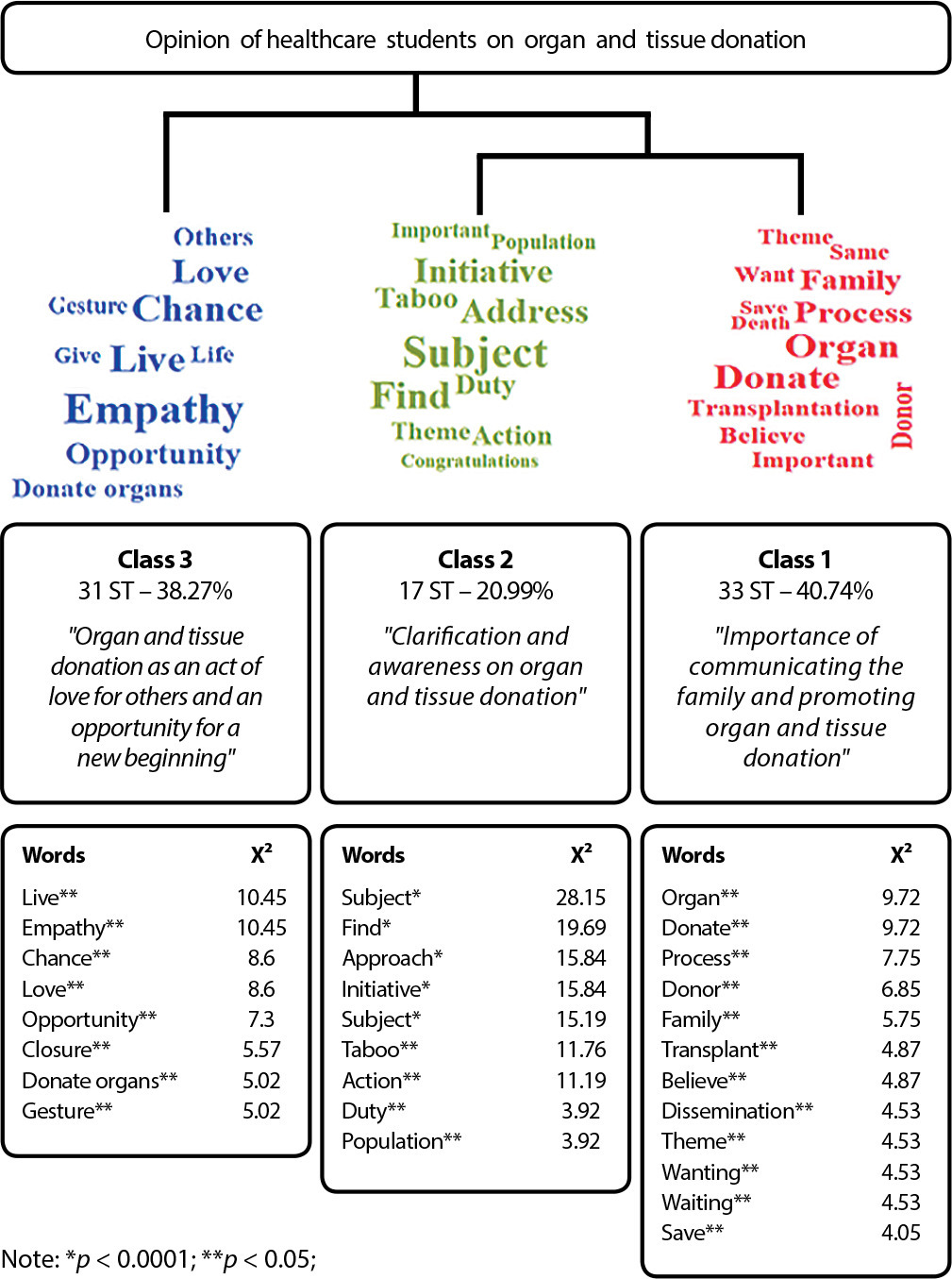
-
ORIGINAL ARTICLE10-18-2022
Being ethical and bioethical in daily life of primary health care: nurses’ perceptions
Revista Brasileira de Enfermagem. 2022;75(3):e20210093
Abstract
ORIGINAL ARTICLEBeing ethical and bioethical in daily life of primary health care: nurses’ perceptions
Revista Brasileira de Enfermagem. 2022;75(3):e20210093
DOI 10.1590/0034-7167-2021-0093
Views0See moreABSTRACT
Objectives:
to understand the perceptions of ethics and bioethics and how to be ethical and bioethical in daily life of Primary Health Care, from the perspective of nurses.
Methods:
this is a Holistic-qualitative Multiple Case Study, based on Comprehensive Everyday Sociology, with 54 participants.
Results:
two subcategories and the category Being ethical and bioethical in daily life of PHC: nurses’ perceptions emerged. The ethical and bioethical being permeates a subjective and abstract self, whose fears, anxieties and concerns are intertwined with the human and professional dimensions in daily work and in personal-professional relationship. Ethics and bioethics perceptions emerge from subjectivity, established relationships, lived experiences and daily actions of nurses essential to the profession, professionals and individuals to be cared for.
Final Considerations:
ethical and bioethical perceptions and attitudes are essential to care, management and organizational actions, health care, and the safety of users and professionals.
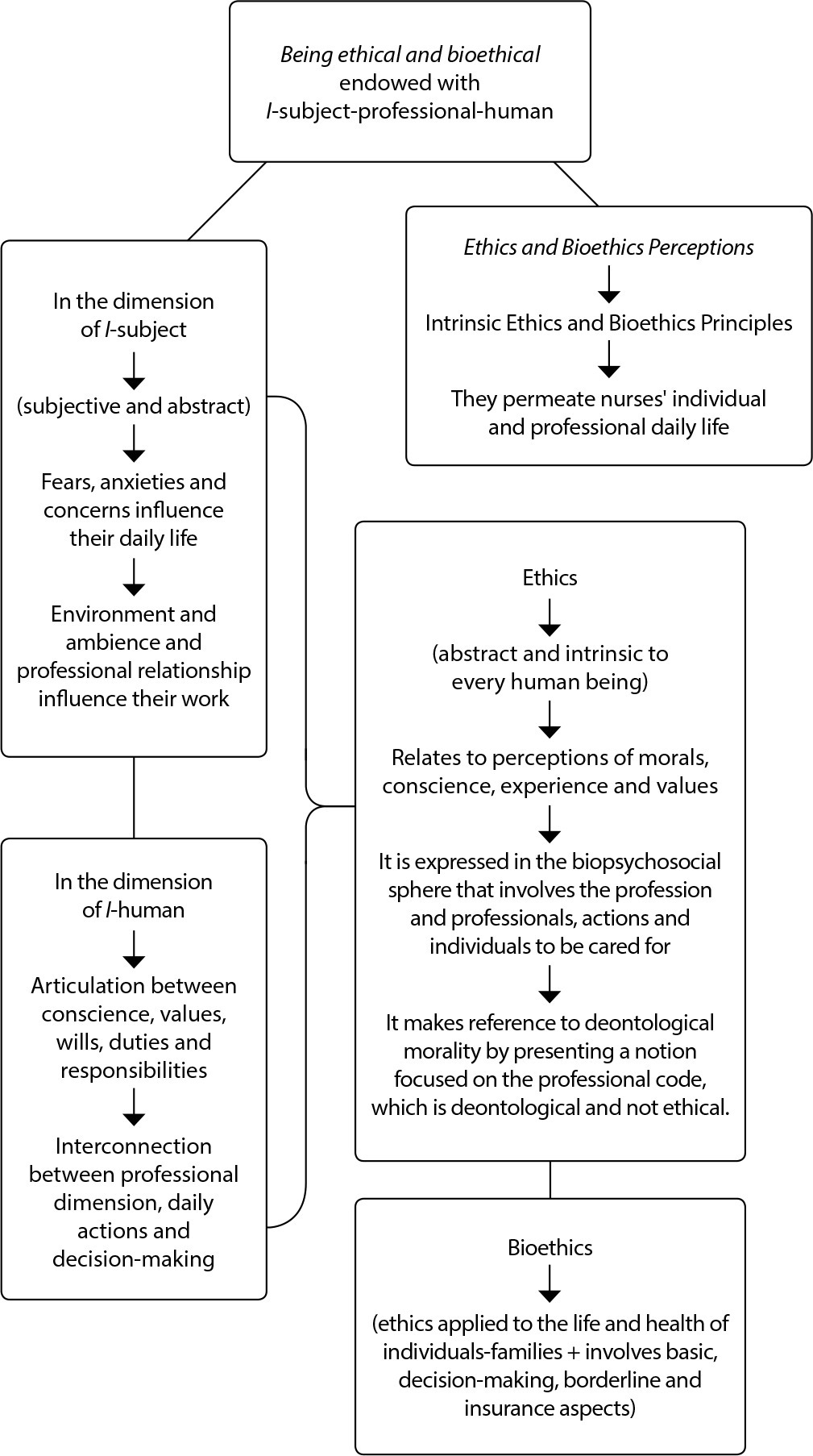
-
ORIGINAL ARTICLE10-18-2022
Breast cancer screening program for risk groups: facts and perspectives
Revista Brasileira de Enfermagem. 2022;75(3):e20210050
Abstract
ORIGINAL ARTICLEBreast cancer screening program for risk groups: facts and perspectives
Revista Brasileira de Enfermagem. 2022;75(3):e20210050
DOI 10.1590/0034-7167-2021-0050
Views0See moreABSTRACT
Objectives:
to measure the frequency and compliance of breast cancer screening, according to the risk for this disease.
Methods:
a cross-sectional study with 950 female users of 38 public Primary Health Care services in São Paulo, between October and December 2013. According to UHS criteria, participants were grouped into high risk and standard risk, and frequency, association (p≤0.05), and screening compliance were measured.
Results:
6.7% had high risk and 93.3% standard risk, respectively; in these groups, the frequency and compliance of clinical breast examination were 40.3% and 37.1%, and 43.5% and 43.0% (frequency p=0.631, compliance p=0.290). Mammograms were 67.7% and 35.5% for participants at high risk, and 57.4% and 25.4% for those at standard risk (frequency p=0.090, compliance p=0.000).
Conclusions:
in the groups, attendance and conformity of the clinical breast exam were similar; for mammography, it was higher in those at high risk, with assertiveness lower than the 70% set in UHS.
-
REVIEW01-01-2018
Coping strategies for domestic violence against pregnant female adolescents: integrative review
Revista Brasileira de Enfermagem. 2018;71:693-699
Abstract
REVIEWCoping strategies for domestic violence against pregnant female adolescents: integrative review
Revista Brasileira de Enfermagem. 2018;71:693-699
DOI 10.1590/0034-7167-2017-0682
Views0See moreABSTRACT
Objective:
To investigate and analyze in the scientific literature coping strategies for domestic violence against pregnant female adolescents.
Method:
This is an integrative literature review, conducted from July to August 2017 on LILACS, SciELO and PubMed, using the descriptors and the MeSH terms: confrontation, violence, adolescent, pregnant women, prenatal care.
Result:
The sample comprised 9 articles that were organized and characterized according to year, country of study and coping strategy used. The main forms of coping involved the active search for cases and the primary care approach with all family members.
Conclusion:
Individualized prenatal care, the change in professional training and networking activities were pointed out as important components of the strategies for coping with violence against pregnant adolescents.

-
RESEARCH01-01-2018
Repercussions of hospitalization due to fall of the elderly: health care and prevention
Revista Brasileira de Enfermagem. 2018;71:763-769
Abstract
RESEARCHRepercussions of hospitalization due to fall of the elderly: health care and prevention
Revista Brasileira de Enfermagem. 2018;71:763-769
DOI 10.1590/0034-7167-2017-0069
Views0See moreABSTRACT
Objective:
To know the repercussions of the fall reported by the elderly and their caregiver during hospitalization in a public hospital in Florianópolis city from October to December 2014.
Method:
Exploratory research with a qualitative approach, conducted by depth interviews with 16 participants, the eight elderly were hospitalized for falls and eight elderly caregivers. Data analysis were performed through the Thematic Content Analysis.
Results:
It was evidenced the thematic axis: Faller Elderly supported by four thematic categories: Changes caused by Falls, I am a faller, I take care of me and Prevention of the Fall. The repercussions of the fall were evidenced in the impairment of the health condition, self-care and functional capacity. We observed the naturalization of the phenomenon and the passivity with the harmful consequences of the event.
Final Considerations:
The fall is valued the more negative its repercussion, such as the need for hospitalization and surgery. Managing the vulnerability of the elderly, especially in primary care, evaluating their comorbidities and their internal and external environment, will minimize unfavorable consequences and the social and financial cost of hospitalizations.
-
RESEARCH01-01-2018
The adolescent and the institutionalization: understanding the phenomenon and meanings attributed to it
Revista Brasileira de Enfermagem. 2018;71:1373-1380
Abstract
RESEARCHThe adolescent and the institutionalization: understanding the phenomenon and meanings attributed to it
Revista Brasileira de Enfermagem. 2018;71:1373-1380
DOI 10.1590/0034-7167-2017-0242
Views1See moreABSTRACT
Objective:
To understand the meaning of being institutionalized and in conflict with the law for the institutionalized adolescent.
Method:
A qualitative, phenomenological-comprehensive study carried out in a Socio-educational Service Foundation in the northern region of Brazil, with 05 institutionalized adolescents. The analysis was carried out under the understanding of the content suggested by Heidgger, thus allowing the construction of analytical categories for a hermeneutical interpretation.
Results:
Conflicting with the law means something negative and bad for the institutionalized adolescents, in which they understand that although there is deprivation of liberty, the period of hospitalization is an important moment for the reflection on the need to start over.
Conclusion:
The meaning of conflicting with the law goes far beyond a simple word, act or behaviour, it is something that only those who experience the phenomenon are able to unveil, arouse deep feelings and provide reflection to the adolescent about the damages caused by the infraction.
-
RESEARCH01-01-2018
Identification of post-cesarean surgical site infection: nursing consultation
Revista Brasileira de Enfermagem. 2018;71:1395-1403
Abstract
RESEARCHIdentification of post-cesarean surgical site infection: nursing consultation
Revista Brasileira de Enfermagem. 2018;71:1395-1403
DOI 10.1590/0034-7167-2017-0325
Views0See moreABSTRACT
Objective:
To describe the profile of women in relation to their living conditions, health status and socio-demographic profile, correlating it with the presence of signs and symptoms suggestive of post-cesarean surgical site infection, identifying information to be considered in the puerperium consultation performed by nurses and proposing a roadmap for the systematization of care.
Method:
Quantitative, exploratory, descriptive, cross-sectional and retrospective review of medical records of women who had cesarean deliveries in 2014, in the city of São Paulo.
Results:
89 medical records were analyzed, 62 of them with incomplete information. In 11, there was at least one of the signs and symptoms suggestive of infection.
Conclusion:
Given the results of the study, the systematization of puerperal consultation is essential. The roadmap is an instrument that can potentially improve the quality of service and the recording of information.
-
RESEARCH01-01-2018
Nursing laboratory and critical education of nurses: approaches and distances
Revista Brasileira de Enfermagem. 2018;71:1500-1506
Abstract
RESEARCHNursing laboratory and critical education of nurses: approaches and distances
Revista Brasileira de Enfermagem. 2018;71:1500-1506
DOI 10.1590/0034-7167-2017-0339
Views1See moreABSTRACT
Objective:
to analyze the contribution of the laboratory of nursing to the critical education of nurses.
Method:
qualitative study, conducted among 18 professors of higher education institutions, being one public and the other private. Data were collected between February and November of 2016 by means of semi-structured interview. To analyze data, it was used a content analysis in the thematic modality.
Results:
it was observed the emphasis in the technical skills development by propagation of behavior and practices; the creation of bonds between professors and students happens on the limit of good interpersonal relationship; the laboratory of nursing may help the critical reflection about the practice, being a place that allows the learning of ethics.
Final considerations:
the nurse education, carried out by the laboratory of nursing, have to overcome the emphasis in the uncritical reproduction of practices and to observe the nurse’s power to think about the reality in the meaning of its modification.
-
RESEARCH01-01-2018
Introduction of the School Health Program in the city of Cascavel, Paraná State: report of nurses
Revista Brasileira de Enfermagem. 2018;71:1540-1547
Abstract
RESEARCHIntroduction of the School Health Program in the city of Cascavel, Paraná State: report of nurses
Revista Brasileira de Enfermagem. 2018;71:1540-1547
DOI 10.1590/0034-7167-2017-0188
Views1See moreABSTRACT
Objective:
to understand the introduction of the School Health Program in the city of Cascavel, Paraná State, as opposed to the report of nurses.
Method:
a qualitative study with fifteen participants. The data were collected from April to August 2015, through semi-structured interviews, analyzed by content analysis and thematic modality.
Results:
the category “Introduction process” of the School Health Program integrates the subcategories “Identified health problems” and the “Challenges of intersectoriality”. The program was implemented quickly, with a fragile training of professionals to perform in the phases that compose it. Structural conditions of schools, human and material resources, and emerging intersectoral interaction were identified obstacles. The integration of the health, school, and family constitutes the program’s potentiality.
Final considerations:
it is understood that the actions of the program were based on health assessments of students, and it is necessary for professionals and managers to discuss and analyze the obstacles identified to achieve all the proposed objectives.
-
RESEARCH01-01-2018
Knowledge about precautions in Primary Health Care: tool validation
Revista Brasileira de Enfermagem. 2018;71:1589-1595
Abstract
RESEARCHKnowledge about precautions in Primary Health Care: tool validation
Revista Brasileira de Enfermagem. 2018;71:1589-1595
DOI 10.1590/0034-7167-2017-0886
Views0See moreABSTRACT
Objective:
To elaborate and validate a tool to assess knowledge and behavior of nursing professionals about standards and specific precautions in the Primary Health Care.
Method:
Methodological study of the elaboration and validation of the tool by thirteen experts judges, using a Likert scale of 4 points, with Content Validity Index ≥ 0.80, on clarity, relevance and pertinence.
Results:
A tool composed of 47 dichotomous questions to assess knowledge and 12 questions, with five options of answers, for the referred behavior. In the validation, only one item was deleted, related to the “Hands Hygiene” axis and one item was reformulated, regarding “Use of Common Gloves” and another 11 changed writing. The tool as a whole was assessed for relevance, comprehensiveness and representativeness within the scope of the topic investigated.
Conclusion:
The developed tool has been validated and is now available for use in Primary Health Care.
-
RESEARCH01-01-2018
Training in diabetes education: meanings attributed by primary care nurses
Revista Brasileira de Enfermagem. 2018;71:1611-1618
Abstract
RESEARCHTraining in diabetes education: meanings attributed by primary care nurses
Revista Brasileira de Enfermagem. 2018;71:1611-1618
DOI 10.1590/0034-7167-2017-0792
Views1See moreABSTRACT
Objective:
seize meanings attributed by primary care nurses to training in diabetes education.
Method:
exploratory and descriptive study, with a qualitative approach, with twenty primary care nurses; semistructured interview script, with interviews processed in the IRaMuTeQ software and analyzed through the Descending Hierarchical Classification. The results were subsidized in the Representational Theory of Meaning.
Results:
nurse training in diabetes education is insufficient for holistic action, although it allows the community to be instrumentalized in specific issues about the disease, using the limited tools available, especially lectures. Nurses find themselves in a context of challenges, improvisations, weaknesses, and limitations that determine the meaning attributed to diabetes education and subsequent actions.
Conclusion:
the meanings attributed by the nurses revealed an incipient training, which limits the quality of care provided and instigates the search for qualification.

-
ORIGINAL ARTICLE09-16-2019
Validation of educational booklet: an educational technology in dengue prevention
Revista Brasileira de Enfermagem. 2019;72(5):1318-1325
Abstract
ORIGINAL ARTICLEValidation of educational booklet: an educational technology in dengue prevention
Revista Brasileira de Enfermagem. 2019;72(5):1318-1325
DOI 10.1590/0034-7167-2018-0771
Views0See moreABSTRACT
Objective:
to validate a booklet on dengue prevention in order to make it an educational technology to be used with the population.
Method:
methodological study, carried out with two groups of judges specialized in health and other areas. For data analysis, the calculation of Content Validity Index was carried out.
Results:
the booklet, in general, was considered valid by the expert judges, since it obtained an overall CVI of 70%. However, it has undergone a textual and aesthetic re-elaboration. The changes were based on the substitution of expressions, phrases, information additions and language adequacy. The illustrations were redone, adding clarity, expressiveness, movement, interaction and contextualization.
Conclusion:
the booklet is valid to be used for the population, with the purpose of informing, in a playful way, the forms of prevention and combat to mosquito transmitting dengue.

-
REVIEW09-18-2020
Mental health of healthcare professionals in China during the new coronavirus pandemic: an integrative review
Revista Brasileira de Enfermagem. 2020;73:e20200338
Abstract
REVIEWMental health of healthcare professionals in China during the new coronavirus pandemic: an integrative review
Revista Brasileira de Enfermagem. 2020;73:e20200338
DOI 10.1590/0034-7167-2020-0338
Views0See moreABSTRACT
Objective:
to identify publishing related to the mental health of health professionals working in the front line of the COVID-19 pandemic.
Methods:
an integrative review that included primary articles indexed in the Latin American and Caribbean Literature in Health Sciences, Medical Literature Analysis and Retrieval System Online, Cumulative Index to Nursing and Allied Health Literature, Scopus, Embase, Web of Science, Science Direct databases and US National Library of Medicine databases. The result analysis was performed descriptively, in four analytical categories.
Results:
The publishing involved aspects related to insufficient personal protective equipment, feelings of fear and stigma, the need for psychological and psychiatric support and the possibility of post-outbreak mental disorders.
Conclusion:
All mentioned aspects have a direct impact on the mental health of professionals, demanding the creation of strategies that minimize the emotional burnout of workers, considering that each country and culture reacts differently to the disease.

-
ORIGINAL ARTICLE06-27-2019
Religious/spiritual coping and level of hope in patients with cancer in chemotherapy
Revista Brasileira de Enfermagem. 2019;72(3):640-645
Abstract
ORIGINAL ARTICLEReligious/spiritual coping and level of hope in patients with cancer in chemotherapy
Revista Brasileira de Enfermagem. 2019;72(3):640-645
DOI 10.1590/0034-7167-2018-0358
Views0See moreABSTRACT
Aim:
To demonstrate the relationship between religious/spiritual coping and hope in cancer patients undergoing chemotherapy.
Method:
This is a cross-sectional, descriptive study with a quantitative approach performed in a reference outpatient clinic in Caruaru, PE, between August and October 2017. A total of 82 cancer patients undergoing chemotherapy were included in the study, using the brief religious/spiritual coping scale (RCOPE-Brief) and the Herth Hope Scale (HHS).
Results:
The sample presented mean positive RCOPE scores (3.03 ± 0.41) and the level of hope was considered high (42.7 points ± 3.67). Patients who had a high RCOPE score were found to have a higher mean of Herth’s level of hope (44.12 points).
Conclusion:
This study becomes relevant to nursing professionals by encouraging care that takes into account the patient’s spiritual dimension in order to stimulate positive mechanisms of religious coping and, consequently, raise the levels of hope.
-
ORIGINAL ARTICLE04-22-2020
Construction and validation of an educational booklet on care for children with gastrostomy
Revista Brasileira de Enfermagem. 2020;73(3):e20190108
Abstract
ORIGINAL ARTICLEConstruction and validation of an educational booklet on care for children with gastrostomy
Revista Brasileira de Enfermagem. 2020;73(3):e20190108
DOI 10.1590/0034-7167-2019-0108
Views0See moreABSTRACT
Objectives:
to describe the process of construction and validation of an educational booklet on care for children with gastrostomy, directed to caregivers.
Methods:
a methodological study developed in five stages: bibliographic survey; situational diagnosis; illustration, layout, design and text construction; expert validation and Flesch-Kincaid Readability calculation; validation with the target audience. Content Validity Index and Suitability Assessment of Materials were applied for expert analysis.
Results:
the Content Validity Index obtained overall score of 0.93. In the Suitability Assessment of Materials score, the booklet scored 85.2%. It presented a satisfactory readability percentage, with an overall score of 72%, and was consistent with caregivers’ assessment in the validation with the target audience, considering the explanatory technology, important and adequate.
Conclusions:
the developed educational booklet was considered valid for use by caregivers, thus contributing to the maintenance of best practices in care for children with gastrostomy.
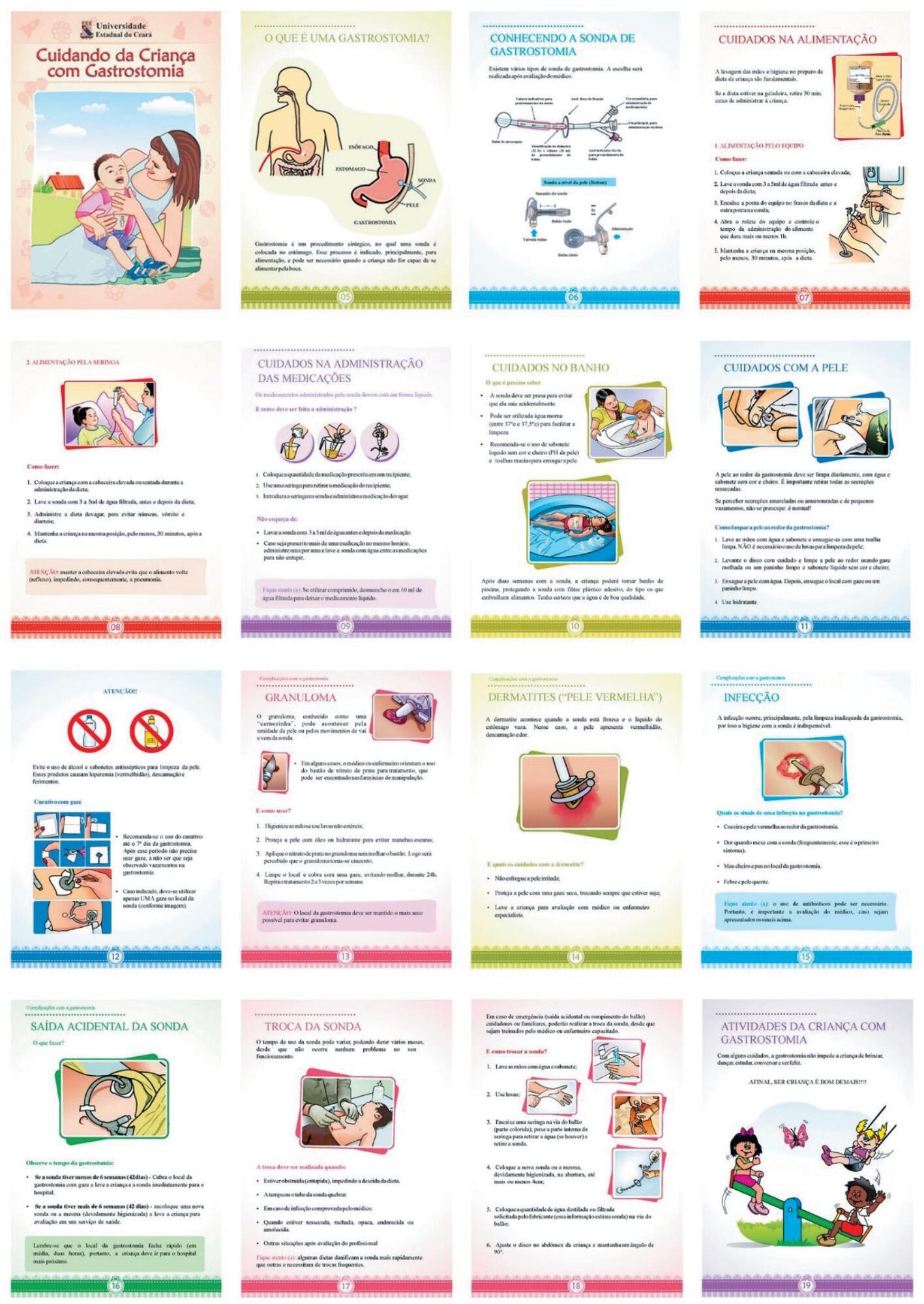
-
REVIEW12-05-2019
Hospital transition care for the elderly: an integrative review
Revista Brasileira de Enfermagem. 2019;72:294-301
Abstract
REVIEWHospital transition care for the elderly: an integrative review
Revista Brasileira de Enfermagem. 2019;72:294-301
DOI 10.1590/0034-7167-2018-0286
Views0See moreABSTRACT
Objective:
to identify evidence of scientific production on hospital transition care provided to the elderly.
Method:
an integrative review, with publications search in the MEDLINE, PubMed, LILACS, BDENF, Index Psychology and SciELO databases, with keywords and Mesh terms: elderly, hospitalization, patient discharge, health of the elderly, and transitional care, between 2013 and 2017 in English, Portuguese and Spanish. The 14 selected articles analysis was carried out through exploratory and critical reading of titles, abstracts and results of the researches.
Results:
transitional care can prevent re-hospitalizations as they enable rehabilitation, promotion and cure of illnesses in the elderly.
Final considerations:
transitional care implies the improvement of the quality of life of the elderly person, requiring skilled health professionals who involve the family through accessible communication.

-
REVIEW08-07-2020
Positive aspects of authentic leadership in nursing work: integrative review
Revista Brasileira de Enfermagem. 2020;73(6):e20190118
Abstract
REVIEWPositive aspects of authentic leadership in nursing work: integrative review
Revista Brasileira de Enfermagem. 2020;73(6):e20190118
DOI 10.1590/0034-7167-2019-0118
Views0See moreABSTRACT
Objective:
To identify and analyze the existing scientific production on the positive aspects of authentic leadership in the nurse’s work process.
Method:
This is an integrative literature review. The databases used were Scientific Electronic Library Online; Latin American and Caribbean Literature on Health Sciences; and National Library of Medicine – National Institutes of Health.
Results:
In this study, 17 articles were selected for analysis; 1 study (6%) was published in a national journal, and 16 (94%) were international studies. Of the 17 (100%) articles studied, 11 (65%) were developed in Canada. The hospital environment was present in the 17 (100%) articles.
Final considerations:
Authentic leadership has several positive aspects that significantly influence the nurse’s work process, such as engagement and job satisfaction, retention of new nurses, organizational commitment, among others.
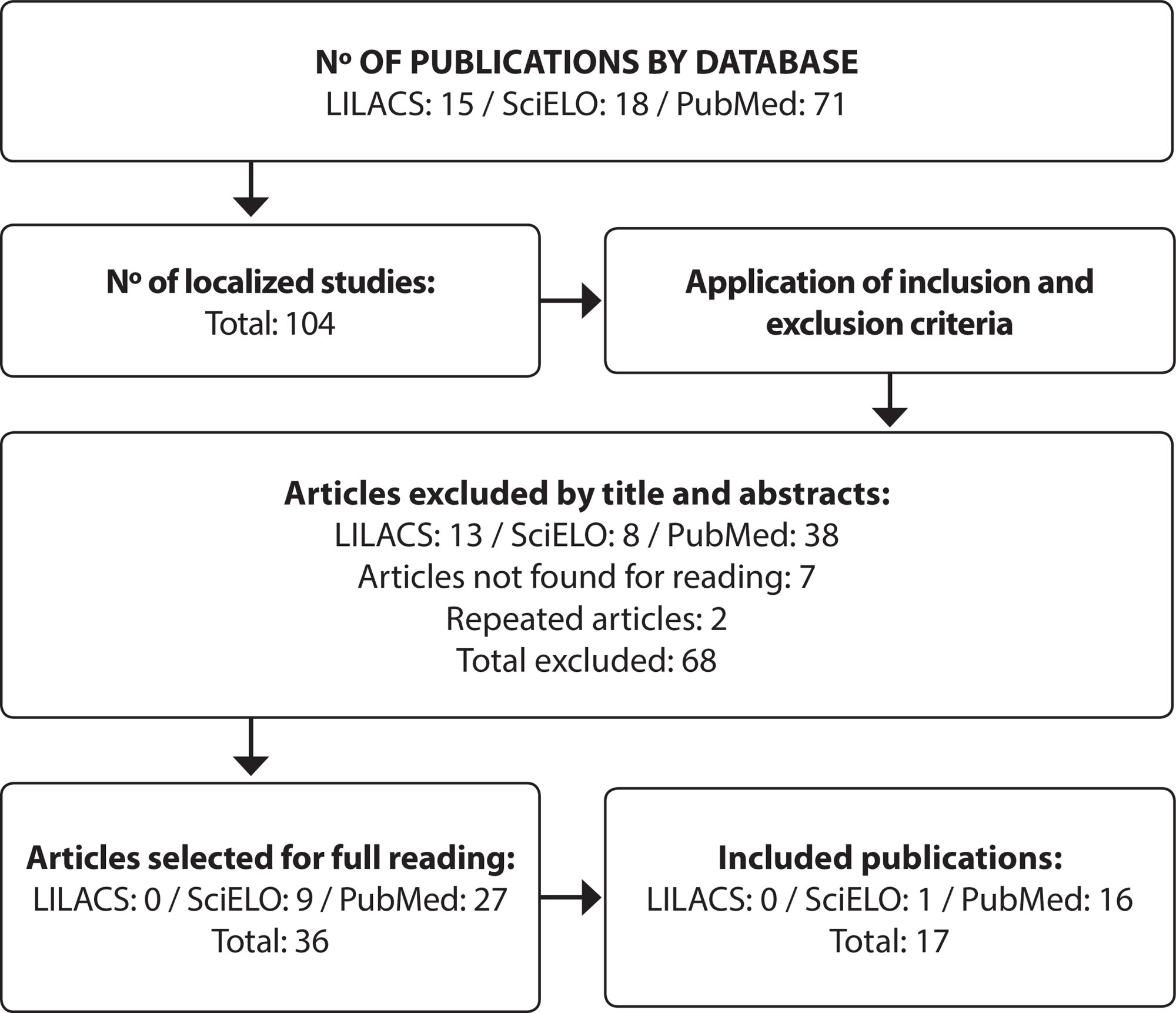
-
ORIGINAL ARTICLE12-21-2020
Development of an appearance validity instrument for educational technology in health
Revista Brasileira de Enfermagem. 2020;73:e20190559
Abstract
ORIGINAL ARTICLEDevelopment of an appearance validity instrument for educational technology in health
Revista Brasileira de Enfermagem. 2020;73:e20190559
DOI 10.1590/0034-7167-2019-0559
Views1See moreABSTRACT
Objectives:
to develop and evaluate the convergence of the instrument for the appearance validity of educational technologies in health.
Methods:
methodological study conducted in two steps. In step 1, the instrument items were developed, with subsequent content validity by nine specialists in the development of educational technologies in health. In step 2, the convergent validity between another instrument and the appearance instrument was performed. Correlation results above r> 0.3 and p <0.05 were considered as plausible convergent validity.
Results:
the ten items of the initial version of the appearance instrument were submitted to content validity that resulted in a final version with 12 items (Content Validity Index = 0.93). The correlation indexes were strong with the objective and appearance domains; moderate with motivation, organization and total; and weak with writing style.
Conclusions:
the appearance instrument demonstrated content validity and convergent validity, in addition to a strong correlation with the other instrument.
-
ORIGINAL ARTICLE02-10-2020
Burnout among nursing students: predictors and association with empathy and self-efficacy
Revista Brasileira de Enfermagem. 2020;73(1):e20180280
Abstract
ORIGINAL ARTICLEBurnout among nursing students: predictors and association with empathy and self-efficacy
Revista Brasileira de Enfermagem. 2020;73(1):e20180280
DOI 10.1590/0034-7167-2018-0280
Views0See moreABSTRACT
Objective:
to analyze burnout, its predictors and association with empathy and self-efficacy among nursing students.
Method:
cross-sectional analytical study with 284 students from five state universities in the state of Parana, Brazil. The instruments applied were: social and academic questionnaire, Maslach Burnout Inventory, Interpersonal Reactivity Index and Occupational Self-Efficacy Scale (Short Form). Spearman’s correlation and univariate and multivariate logistic analysis were used.
Results:
6.0% of the students presented high burnout, 36.3% presented high emotional exhaustion, 37.7% presented high depersonalization and 28.2% presented low personal accomplishment. The burnout predictors were: absence of physical activity; weekly workload >24 hours; low empathic concern. There were negative correlations between empathy (empathic concern and perspective taking) and depersonalization; self-efficacy and emotional exhaustion; and positive correlations between personal accomplishment and empathy and self-efficacy.
Conclusion:
Personal factors and an academic variable were burnout predictors among nursing students. The correlations suggest that self-efficacy and empathy can prevent burnout.
Search
Search in:
Nuvem de Tags
Adolescente (85) Atenção Primária à Saúde (239) COVID-19 (91) Criança (91) Cuidados de Enfermagem (269) Educação em Enfermagem (151) Educação em Saúde (139) Enfermagem (930) Enfermagem Pediátrica (86) Estudantes de Enfermagem (77) Estudos de Validação (131) Família (87) Idoso (208) Promoção da Saúde (99) Qualidade de Vida (104) Saúde do Trabalhador (86) Saúde Mental (145) Saúde Pública (82) Segurança do Paciente (150) Tecnologia Educacional (100)



